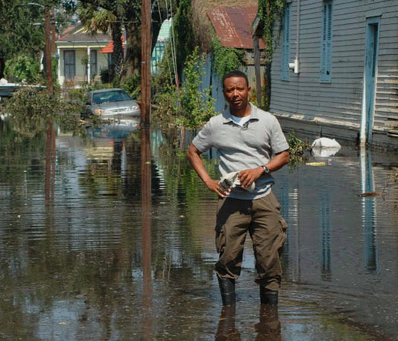Our August issue, in case you haven’t noticed yet, includes a package of stories from people connected by their Hurricane Katrina experiences. Local TV newsman Steve Pickett, a Lake Highlands resident, was one of the first on the scene of the flooding that washed away neighborhoods and lives across Mississippi and Louisiana in August 2005. Stations in the area were destroyed, so it was up to journalists such as Pickett and his cameraman Billy Sexton to show the world what was happening during this historic event.
________________________________
Except the spotlight illuminating Steve Pickett for his live broadcast, Slidell, La., was pitch-dark. Beneath Pickett’s steady voiceover rolled grisly images from the preceding days: homes submerged and residents on rooftops or wading through dark, waist-high water; faces distorted by pain, confusion and heartbreak; human limbs and hair peeking out from beneath piles of rubble.
Pickett traveled to Louisiana to cover Hurricane Katrina and its aftermath, he says, but when floodwaters marooned a city and many of its inhabitants, he became a part of an historic event.
“Like most weather-related stories, we had a team set up to cover Katrina,” the CBS 11 reporter says. He and other reporters took shifts at disaster areas in the weeks following the storm.
“But once we got there, it was clear this was not a weather story but an event, and there is a big difference. Now it is about lives.”
The local news teams in New Orleans had lost everything, their studios and equipment, so reporters such as Pickett were invaluable to the Katrina coverage.
At first, Pickett and his cameraman Billy Sexton spent nights in the CBS news truck as they covered outskirts of New Orleans, such as Slidell and Mandeville, La., and Pass Christian, Miss.
“Once the levees broke, there was no getting into New Orleans,” he says.
Sexton had family in the region.
“Billy’s brother took us in one night. His mother’s home, in Mandeville, was destroyed. Billy worked nonstop while he and his family dealt with the destruction. I don’t know how he did it.”
There was no shortage of shocking news from the suburbs.
“Nothing was left,” Pickett says of the homes and businesses that once populated the area. He recalls the sound of gunshots ripping through the night during one of his live spots, when he was the only visible thing within miles — a target, he feared. The generator-equipped news truck was an added hazard, he says, because of the lack of functioning vehicles in the area.
“There were people who wanted ours.”
What the newsmen encountered when they finally reached New Orleans was even worse — “indescribable,” Pickett says.
Desperate survivors begged them to broadcast messages to loved ones — “Tell them I am alive,” they pleaded, names scrawled on hoisted cardboard signs.
Pickett and Sexton helped a broken elderly couple they found trudging in the blazing sun. “We knew they would die if we didn’t help, so we took them to a makeshift command center where they at least stood a chance,” Pickett recalls. “We had to leave them. We asked a stranger to look after them. We saw another woman with a broom, sweeping the street, a dead body only yards away from her feet — all she said to us was, ‘I am not a refugee.’”
Pickett, a longtime Lake Highlands resident, won an Emmy for his Iraq War coverage. He has been on the scene following F5 tornadoes. He’s covered every sort of atrocity. More recently he reported from the site of an earthquake in Haiti, which caused greater casualties than Katrina.
But Katrina stays with him, more than anything.
“To see a city underwater, all hell broken loose, it changes you. You don’t think this can happen in an American city.”
Pickett tried to balance his rescue and reporter modes. He slept in the truck and vacant buildings. His live reports ran during the 5 and 6 a.m. and the 5 and 10 p.m. newscasts.
He rode on rescue boats. Even in the six-foot high waters, some refused to leave their homes.
“They were in shock. The rescuers were begging them to come and some wouldn’t. As a reporter you have to try to remain objective, but I wanted to scream.”
He realizes there were rampant reports of looting and violence, but that generally was not his experience.
“I saw people in desperate situations who needed help. We saw and documented the efforts to save people. We saw thousands of people getting on buses, no idea where they were going. Older people, a woman who looks just like your grandmother, walking toward you, lost, confused, her lifelong home is underwater, she doesn’t know where her family is or where this bus is taking her, and there is nothing you can do.”
As we embark on the 10 year anniversary of the big storm, read more stories, including the one about Steve Pickett’s wife, Rachel, who was awarded for her bold Katrina efforts, and from survivors who enrolled in Lake Highlands High School after evacuating their homes … more.






